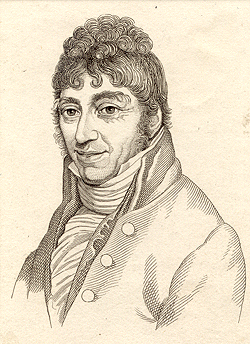Willem Bilderdijk
Willem Bilderdijk (born September 7, 1756 in Amsterdam , † December 18, 1831 in Haarlem ) was a Dutch lawyer and writer .
Life
Bilderdijk (pronounced -deik), son of a doctor, studied in Leiden 1780-82 Law and practiced The Hague as a lawyer. An avid orangist , he left the Netherlands in 1795 when the French entered and fled to London . In 1797 he moved to Braunschweig and made himself known as a legal writer through the Observationes et emendationes juris (Braunschweig 1806), which he later reworked (Leiden 1820, 2 vols.).
After Louis Bonaparte took office , he returned to his homeland in 1806, to the newly founded Kingdom of Holland , where he was appointed librarian to the king and soon afterwards also a member and secretary of the Dutch National Institute. After Louis' abdication, Bilderdijk retired to Leiden, had lived in Haarlem since 1827 and died there on December 18, 1831 after he had forfeited his pension as a result of the restoration.
plant
With a strictly Calvinistic upbringing, Bilderdijk remained a keen supporter of Greek and French classicism and an equally keen critic of rationalism . What his critics rejected as narrow-mindedness and exaggerated rhetoric, won him the admiration of Nicolaas Beets , Isaäc da Costa and Jan Jacob Lodewijk ten Kate .
As a poet, Bilderdijk tried his hand at all areas of poetry . As early as 1774 he won a prize with the poem Over the invloed der Dichtkunst op het staatsbestuur ; the same award was given to him in 1775 for Deehlede tot het vaderland .
He gave the first sample of his study of the classics with his transmission of the Sophoclesian tragedies : Koning Edipus and Dood van Edipus (1789). Other works of that time are: Mijn verlustiging (1781) and the collection of poems Bloemptjens (1785), which mainly contained poems in the style of Minnelieder .
While he was staying abroad, other collections appeared in quick succession, as Mengelpoezij (Amsterdam 1799, 2 vols.), Poezij (1803–1807, 4 vols .; 2nd ed. 1822) and Mengelingen (1804–1808, 4 vols .) .), followed by Buitenleven , an adaptation of Delilles L'homme des champs (1803) and Fingal (after Ossian , 1805).
On his return to the Netherlands, he dedicated the Nieuwe mengelingen (Amsterdam 1806, 2 vols.) To Louis Bonaparte and wrote the descriptive poem De ziekte der leererden ( The diseases of the learned , Amsterdam and Hague 1807, 2nd ed. 1829).
At that time he also tried his hand at the drama with the tragedies Floris de vijfde (1808), Willem van Holland , Kormak and others (in Treurspeien ", Haag 1808-1809, 3 vols.) And published De Mensch , a rewording of Pope's essay on man (1808), as well as collections Najaarsbladen (1808, 2 vols.), Verspreide gedichten (1809, 2 vols.) and Winterbloemen (Haarlem 1811 2 vols.).
He celebrated the liberation of the Netherlands in the poetry of Hollands verlossing (Amsterd. 1813-14, 2 vol .; 2nd ed. 1833) and the Vaderlandsche ultboezemingen (1815). The hymn Willem Frederik and his Wapenkreet were also created during this time.
His Affodilles (Haarlem 1814) sprang from a depressed mood ; His Nieuwe uitspruitsels (1817), Wit en rood (1818, 2 vols.), the satirical poem De dieren (1818) and the Nieuwe Dichtschakeering (Amsterdam. 1819), and finally the fragmented epic poem De ondergang der reveal serene peace of mind Eerste Wareld (1820; last edition, that. 1880).
Among the long series of his other seals are noteworthy:
- Zedelijke Gispingen (1820);
- Sprokkelingen (1821);
- Krekelzangen (1822-1823, 3 vols.);
- Chaff (1823);
- Rotsgalmen (1824, 2 vols.);
- Navonkeling (1826, 2 vols.);
- Oprakeling (1826 & 1827);
- Devoet in't graf (1827);
- Naklank (1828);
- Vermaking (1828 & 1829);
- Schemerschijn (1829);
- Nasprokkeling (1830) and
- Nalezingen (1833, 2 vol.).
After his death the poems: De geesten wereld and Het waarachtig goed (Amsterd. 1843; German von Quack, Stuttgart 1853) appeared. In these numerous productions, Bilderdijk expresses himself as a thoughtful and imaginative, versatile and peculiar poet, who is at the same time characterized by a rare mastery in handling the form. His own field is poetry , while he lacks talent for the epic , even more for the drama. He was anti-liberal and stuck to the old French art rule, which made him inaccessible to the impressions of English and German literature, which he literally hated.
His historical work Geschiedenis des vaderlands (ed. Von Tydeman, Amsterd. 1832–53, 13 vols.) Is kept in an absolutist spirit. As a linguist, he gave the impetus to a more thorough study compared to the traditional Seegenbeek direction. Particularly noteworthy in this area are the Taal en verseidenheden (1820–25, 8 vol.) And Beginsels der woordvoorsching (1831). Da Costa (Amsterdam. 1856–59, 16 parts) obtained a complete edition of his “poetry”, the final volume of which contains the biography of the poet De Mensch en de Dichter WB .
family
His second wife, Katharina Wilhelmina , née Schweickhardt, (* 1777 in The Hague), married to Bilderdijk since 1797, was also a poet. She provided several things in her husband Poëzy (1803) and the tragedy Elfride in his Treurspelen (1808), published poems for kinderen (1813) and tragedies ( Dargo , Ramiro , 1816) and died April 16, 1830. Her poetry was published in 3 volumes (Haarlem 1858–60), edited by Da Costa.
Web links
- Works by Bilderdijk, Willem as online public domain texts at Project Gutenberg (Dutch)
- The Bilderdijk Haarlem Foundation (Bilderdijk Foundation)
| personal data | |
|---|---|
| SURNAME | Bilderdijk, Willem |
| BRIEF DESCRIPTION | writer |
| DATE OF BIRTH | September 7, 1756 |
| PLACE OF BIRTH | Amsterdam |
| DATE OF DEATH | December 18, 1831 |
| Place of death | Haarlem |
